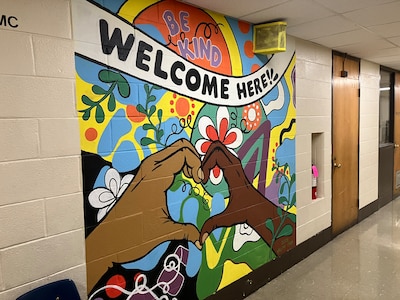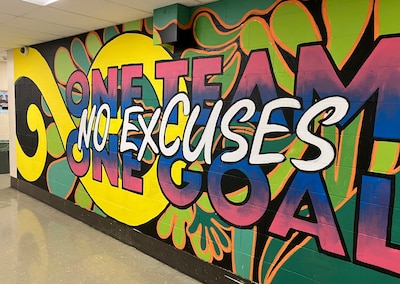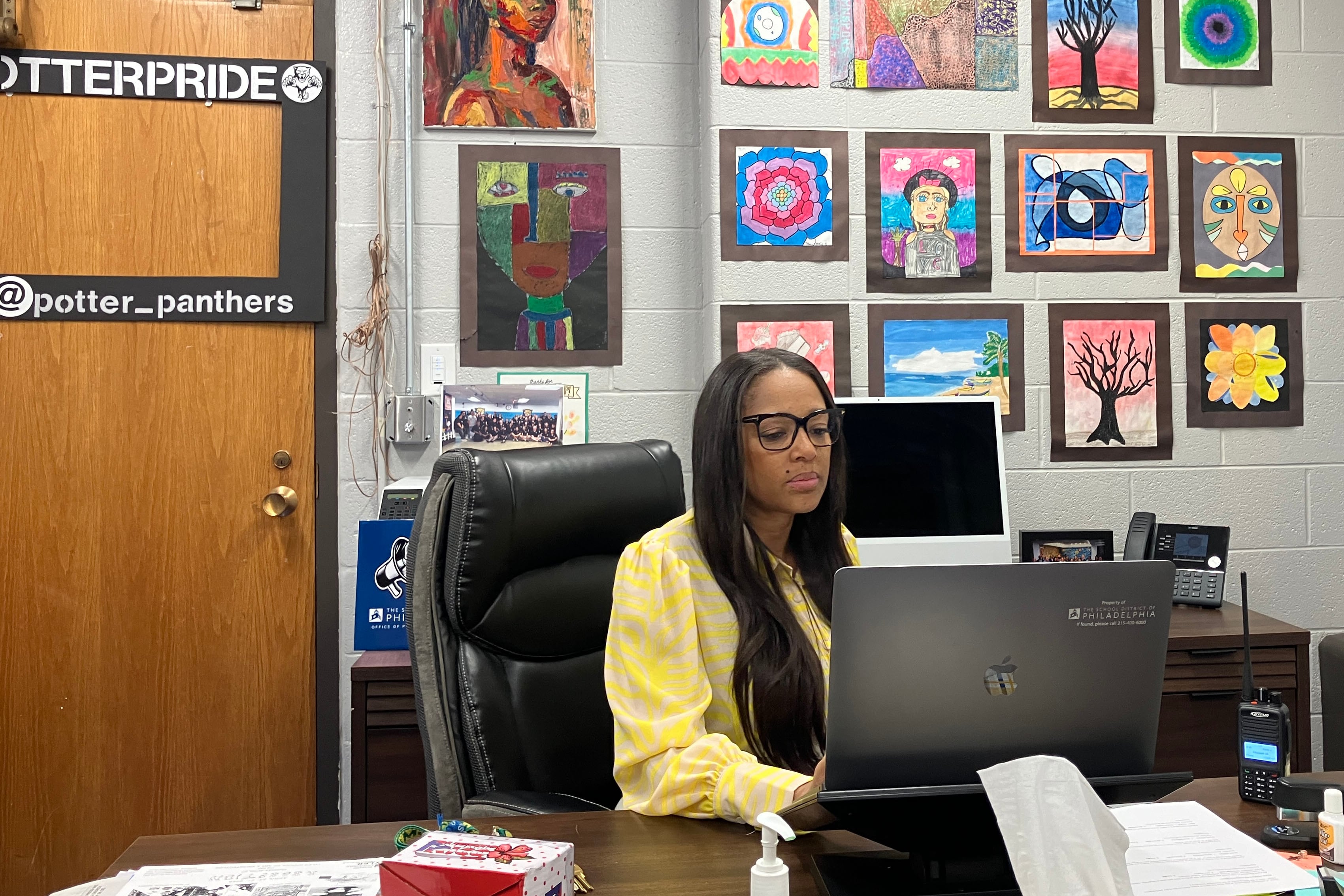Sign up for Chalkbeat Philadelphia’s free newsletter to keep up with news on the city’s public school system.
There’s nothing Philadelphia Principal Nichole Polk dislikes more than a blank, beige wall.
One of her first priorities when she became principal of North Philly’s Potter-Thomas School in 2019 was to fill her hallways with vibrant colors, positive affirmations (”be kind — all are welcome here”), and towering murals of basketballs, paint tubes, open books, and chemistry flasks.
Polk said she wanted every student and every staff member to get excited about being in the building. Because growing up in Philly, Polk’s own school experience did not make her feel welcome.
Polk said she was made fun of by her classmates and teacher when she developed a stutter in fifth grade. She became terrified to speak and withdrew within herself, suffocating the part of her that liked to pull pranks on her younger sisters and joke around with her friends.
“I didn’t necessarily want to be there, but I knew that I had to be,” Polk said of her time in school. Her mom, Alfreda, placed a lot of importance on all three of her daughters getting a good education and insisted that Polk be held back a year to get speech services.
“I really didn’t see myself going to college, because my relationship with school wasn’t good,” she said.

Prior to becoming an educator, Polk tried out nursing, did a stint at TV Guide, and held other odd jobs around the city. It wasn’t until she had her first daughter that something clicked: “I need a life with purpose, because now I’m about to be a mom.” she said.
She found her way back to education as a therapeutic support staff member working with an eighth grader at another district school. It was there that Polk said she noticed some of the same behaviors from students and teachers that so upset her during her own time in school.
“I was like, wow, this is not good for these children,” she said.
From there, Polk became a literacy intern teacher, then a classroom teacher, school-based teacher leader, assistant principal, and eventually took her place at the helm of Potter-Thomas as principal.
Now, she said her goal is to create a safe haven for all her students, more than 100 of whom are learning English and may need extra support to speak up for themselves, just like she did.
Her work earned her a coveted Lindback Distinguished Principal Award this year, and the honor came with $20,000 to be used for her school community.
Among Polk’s favorite phrases on her school walls is one about embracing the “power of yet” and the bright future that she said all of her students (and staff members) contain within them.
This interview has been lightly edited for length and clarity.
What was your own experience with school growing up in Philly?
I never saw myself as an educator because of my own educational journey, it wasn’t a good one. It was good up until fifth grade. In fifth grade I developed a stutter. Back then, we did round-robin reading, and just knowing that my turn was coming up — I knew that the anxiety makes my stutter more challenging. No matter how much I try to prepare, I would stutter. I was made fun of, unfortunately, by my classmates and my teacher, and it silenced me for the year. I just showed up to school every day and didn’t say anything. I didn’t participate. No one came over to me to say, “Hey, is everything okay?”
I got F’s all the way through, and when it was time for promotion, my mom said, “Absolutely not.” I was left back. My mom got me speech [therapy]. I stayed in speech up until about 10th, 11th grade. I learned how to [emotionally] regulate, and I was also becoming more secure in myself — that made it a little easier dealing with the stutter.
I always felt like my mother, my parents, kept me safe and that I could go to them, but at the same time, I didn’t know how to articulate that and bring that to her to say, “Mom, I’m going to school and not talking because the teacher is making fun of me.”
Adults are supposed to make me feel loved, and like this is a safe environment for me. So how can I say this is not safe? I was really confused.

How do you think your experience with school impacted the leader you are now?
Looking back on it, it was unfortunate, but it was such a blessing because without the experience, I wouldn’t be where I am right now.
My leadership “why” is to ensure that every staff member, student, parent, and community member who comes in this building feels safe, loved, and is always learning.
To have a growth mindset, I have to feel safe and loved in the space in order to do that, and I have to feel safe within myself. Once that happens, it’s like the sky’s the limit.
I have seen children coming into school for the first time or coming into Potter-Thomas for the first time and not knowing that this is a safe space. Because they think, “Hey, I don’t know you. You don’t know me. I need more than a hug on this first time to know that I feel loved and feel safe.” At first, they’re going against, they’re crying. They don’t want to be here. Then, as they see what our school is about, it’s like wow, look at them. It’s a beautiful thing.
We also love up on our teachers in the same way. I’m still learning and growing. I also show up as an example to say, “I’m here to coach you, but here, this coach is here to coach me because I’m learning and growing, too.” You’re not going to be ridiculed for not knowing. You’re not going to be looked down upon for not knowing. You’re going to be supported through not knowing until you know.
Is there anything in the outside community that impacts what goes on at Potter-Thomas?
For a brief moment, the ICE situation had impacted us. Students and families were afraid. Families were afraid to send their students to school. They were afraid to walk them to school because they didn’t know what was going to happen when they got here. Fortunately, that has subsided.
Our parents sometimes have bad experiences too. So we love up on them consistently, so they can drop their barriers and know that this is a safe space for their children and also for them.
Although there is a lot going on out there, we have come a long way for our community to see that that’s out there, but in here, it’s something different. It’s a haven.
What’s the best advice you’ve received?
Be self-reflective. That is very important and is something I do every day, because it keeps me grounded. It also keeps pushing me to learn and grow. One of the best ways to self-improve is to make the decision. If it’s good, you can learn from that. Taking that chance, being a risk-taker, by making the decision and having a good turnout, that’s great. On the flip side, if it didn’t work out, what do you need to do to make it better?
You can go back and forth, you can think the worst, you can even go around calling a bunch of people for feedback, but it’s like, just do it. You’ll be proud of yourself afterwards.
What advice would you give to your younger self in school if you could?
I wonder if I would have known that I was enough earlier on and that I did deserve a seat at the table, what I would’ve realized about my fifth grade experience. Would I have shared what was going on?
Life, we’re living it, so as you continue to move and grow in your journey, how can you do things differently, and then how can you support others along the way?
Carly Sitrin is the bureau chief for Chalkbeat Philadelphia. Contact Carly at csitrin@chalkbeat.org.






